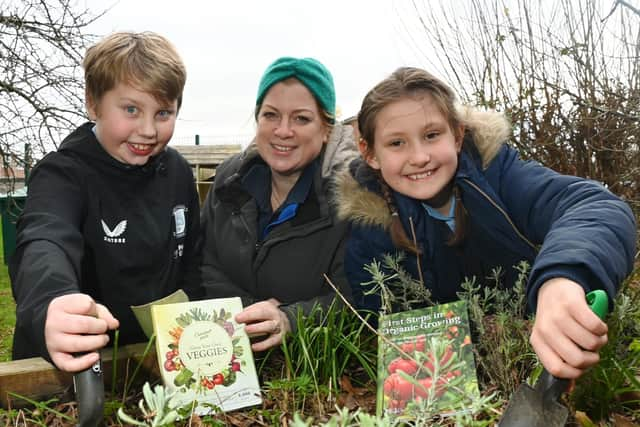Lancashire kids to be taught about veg growing and good food as part of plan to improve health
and live on Freeview channel 276
Teachers and other school staff from areas including Preston are set to be trained in ways in which they can encourage the youngsters in their care to make healthy choices from an early age – including by growing their own food.
The hope is that they are so inspired about nutritious meals that they take the message home to parents and carers and persuade them to serve up healthiest options for the whole family.
Advertisement
Hide AdAdvertisement
Hide AdLancashire County Council has commissioned the Food For Life programme to run a two-year initiative which is designed to instil “a good food culture” - not just in children, but the places where they live.


Ninety percent of Lancashire school caterers are already accredited by Food for Life for the quality of the food they dish up in the dining room.
However, it is sowing the seed of interest in healthy food - and where it comes from - amongst the pupils themselves that can really make a difference, according to the programme manager for Lancashire, Libby Shaw.
“It could be setting up a wormery, growing some potatoes in a pot or [producing food] on a wider scale, if a school has the land to do that.
Advertisement
Hide AdAdvertisement
Hide Ad“There are some really fantastic statistics that show that if you get a child to grow their own vegetables, they are more likely to eat them.


“It’s also good for them just to have that knowledge and understanding that, say, peas are grown out of the ground, they don't just come out of a freezer in the supermarket.
“The idea is to get in there while they are young - and then we can hopefully develop healthy habits for life,” Libby explained.
She also hopes that the programme will help dispel the myth that healthy eating means a bigger family food bill - an understandable concern for families in poorer areas, especially during the ongoing cost-of-living crisis.
Advertisement
Hide AdAdvertisement
Hide Ad“If there are after-school cooking clubs or things like that, menus can be taken home with simple, cheap recipes. It's often a lot cheaper to cook from scratch than it is to buy ready meals with lots of unhealthy additives in them - so there is a way of doing this that can actually save you some money as well,” Libby said.


For Anna Cookson, year 5 teacher and the personal, social, health and economic lead at. St. Stephen’s Church of England Primary School in Preston, financial considerations are just one of several “barriers” to children eating healthily.
“All of our parents really want to feed their children well - so it’s about giving them the tools to [enable] them to do it.
“Some of our families have both parents working full time and that comes with its problems, because they can find it challenging to eat well, consistently, when they're rushing in and out to and from work. Then for some parents, it [can be] a lack of ideas [or] motivation.
Advertisement
Hide AdAdvertisement
Hide Ad“But the big thing that people don't talk about is how expensive it is to be poor - because everything becomes so [costly] if you don't have things like a car to go to a supermarket,” Anna said.


Whatever the reason, she is confident that getting children growing some of their own food will help give them a stake in the healthy eating mission - not least because it involves outdoor learning, from which youngsters “tend to retain a lot of knowledge”.
South Meadow Lane-based St. Stephen’s - recently rated by Ofsted as “outstanding” for pupils’ personal development - benefits from a big environmental space which Anna hopes can be put to good use when the initiative begins in the new term. To that end, she would also be keen to hear from any green-figured locals who would be interested in volunteering to help tend to the plot.
Child weight statistics suggest that the Lancashire rollout of the Food for Life programme - which is part of the Soil Association charity - has come not a moment too soon, with the county having a greater proportion of overweight reception and year 6 pupils than the England average during the 2022/23 academic year.
Advertisement
Hide AdAdvertisement
Hide AdHowever, obesity and severe obesity is either at or below the nationwide level, as is the five-year trend for those measures.
The most deprived wards in Preston, Burnley, Hyndburn, Pendle and Rossendale are amongst the target areas for the Food for Life scheme under the contract with Lancashire County Council, but the authority has also opened up elements of the offering to 100 schools in all other parts of the area.
County Hall’s cabinet member for health and wellbeing, Michael Green, said that the authority is “committed to ensuring children have the best start in life [and] this is one of the three priorities of the Lancashire Health and Wellbeing Board”.


"Commissioning Food For Life will support this [work by] encouraging children to learn about food and where it comes from and promoting access to good nutrition from a young age.
Advertisement
Hide AdAdvertisement
Hide Ad"We believe this is vital to children's development, health and wellbeing and importantly builds the foundations for their future," Coun Green added.
‘MAKE SCHOOL MEALS MORE AFFORDABLE’
Anna Cookson says that while it is good that the standard of catering in Lancashire’s schools is high, families in poorer areas would benefit from school meals in the county being made more affordable.
“Most schools [charge] around three pounds a day. But for those parents that are on the cusp - so they don't qualify for free school meals, but are definitely living on a knife edge - £15 pounds a week per child is just completely unaffordable.
“I just think that if a pound a day was the offer, you would get far more children signed up for school lunches,” Anna said.
Advertisement
Hide AdAdvertisement
Hide AdA strand of the Food for Life programme is about helping to encourage uptake of school meals.
READY, STEADY, COOK
Ahead of the Food for Life scheme launching in Lancashire during the new term, 85 schools have so far expressed an interest in taking part - 27 of which have already enrolled, along with five early years settings.
Lancashire programme manager Libby Shaw says that the “encouraging” response reflects a desire to ensure pupils are eating well.
“During conversations with headteachers and school staff in the county, it is clear they understand why it’s important for children to eat healthy and sustainable food. They are extremely motivated to get their children eating healthier and learning more about good food, with a view to changing the food culture within their school.
Advertisement
Hide AdAdvertisement
Hide Ad“However, time restraints and knowing where to start has been a challenge, which is where Food for Life will support them to implement simple, practical activities to encourage children to grow, cook and learn about where food comes from.
“We will support settings with free face-to-face training which will showcase an integrated and practical approach to learning in the classroom and outdoors. We will also be initiating our first Food for Life Lancashire networking group to support settings and share best practice.”
TIPPING THE SCALES
Across the Lancashire County Council area, which excludes Blackpool and Blackburn with Darwen, these are the latest child weight statistics:
Prevalence of overweight 4-5-year-olds – 13.8 percent (England average 12.2 percent)
Advertisement
Hide AdAdvertisement
Hide AdPrevalence of obesity amongst 4-5-year-olds – 9.1 percent (England average 9.2 percent)
Prevalence of overweight 10-11-year-olds – 14.7 percent (England average 13.9 percent)
Prevalence of obesity amongst 10-11-year-olds – 22.1 percent (England average 22.7 percent)
Source: Office for Health Improvement and Disparities (all figures for 2022/23)